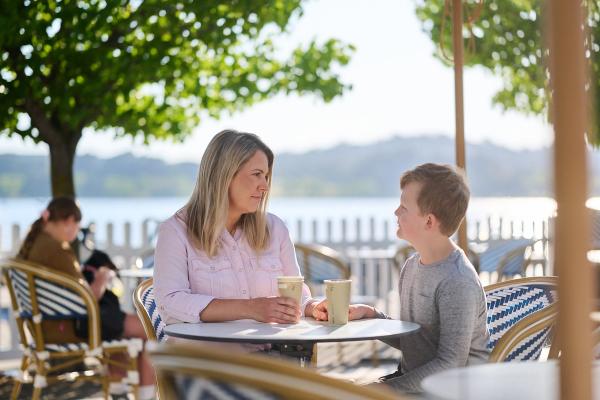
Understanding parenting and custody
Parenting arrangements to be decided after a separation includes broad spectrum of decisions including who the child lives with, when and how frequently they spend time with the other parent or important caregivers, selecting schools or managing medical matters for the child and many other aspects of their welfare and development. These arrangements should be tailored to meet the unique needs of your family and your child’s best interests.
Custody—referred to as ‘live with’ or ‘resident parent’—identifies with whom the child will mainly live with. Sometimes the child may live in a shared care arrangement with each of their parents.
Telling your children
The breakdown of the family unit is one of the most significant and impactful events that can occur during childhood. It’s essential when talking to your children about the separation to keep information limited, age-appropriate and avoid blaming language. Ensure your child knows that they are loved, that they will not be pressured to make choices about their future living arrangements if they don’t want to, and that the change to their family is not their fault. Make sure that children have access to counselling or other support services to help them with emotions arising from the shift in their family structure and relationships – and that you do too!
Making arrangements
The ideal scenario for deciding upon care of children after a separation is for the parents to amicably agree upon parenting and custody arrangements. Agreements can be reached with guidance and support from professionals including family lawyers, psychologists/counsellors and dispute resolution practitioners. These agreements can be legally recorded in a parenting plan or consent order, to provide clarity and enforceability. When consensus cannot be reached, or it is not appropriate for dispute resolution pathways to be taken due to high conflict or risks to safety for you or your children, the Court may be called upon to decide which living arrangements are best.
Key considerations
Best interests of the child: The paramount principle underpinning how the law applies to children’s arrangements after separation and divorce. Working out what is in the best interests of the child requires a consideration of six key factors. They include the child’s views, the benefit of the child to having relationships with both parents, the child’s developmental, psychological, emotional and cultural needs and the abilities of each of parents to meet those needs. Drawn from the UN Convention on the Rights of the Child, it is a subjective concept applying in all cases where decisions affecting a child are to be made.
Safety: From 6 May 2024 the Family Law Act placed emphasis upon the need to prioritise the safety of children and the caregivers of children. This includes safety from being subjected to or exposed to family violence, abuse or neglect. Safety is a key pillar in identifying the option which would be in the children’s best interests and ensure their welfare.
Parental responsibility: A term which refers to the authority and responsibilities parents have in relation to children who are not 18. Decision making responsibility refers to the right of a parent or parents if it is jointly exercised to make decisions about their child including about major issues like health, education, religion and the child’s name. Separation of the parents does not alter parental responsibility, but a Court order can alter parental responsibility for a child. Where it is safe to do so, it is expected that parents will consult each other about long term decisions for the child and place the best interests of the child as the paramount consideration when making major decisions.
The legal process
Should Court intervention become necessary, we guide you every step of the way, from explaining what happens at Court, to preparing your evidence and representing you in Court hearings. Our aim is to secure arrangements that reflect the best interests of your children while minimising the emotional toll on your family.
Commonly asked questions that we can work through with you
- How and when to tell the children we are separating?
- Where will the children live? What happens if I don’t agree with my ex about who the children live with?
- How much time will the child spend with the other parent?
- How do I change the parenting arrangements for my children? Do I have to go to Court?
- What is child support?
- What should I do if I believe my children are at risk or are unsafe with the other parent?
- Can I move away from the other parent with my children?
- Can I travel overseas with my child?
- How do I get a passport for my child when the other parent does not consent?
- Can I change my child’s name?
- Should I attend mediation about my children? Is it compulsory to attend mediation?
Why work with us?
Award-winning expertise: as Canberra's Best Family Law Firm in 2023, our experienced team brings unparalleled knowledge and compassion to your case.
Child-centred approach: we prioritise your children's needs and well-being in recommendations we make, and we draw on the expertise of other professionals including psychologists and therapists.
Collaborative solutions: Wherever possible, we advocate for resolution through mediation and negotiation, saving you time, stress, and expenses.
Ready to discuss your parenting and custody needs?
We're here to provide clarity, support, and expert legal guidance through this challenging time. Contact Parker Coles Curtis to schedule a consultation and learn how we can assist with your parenting and custody arrangements, ensuring a brighter future for your family.


